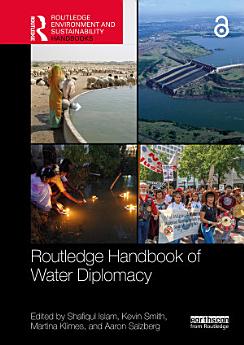Routledge Handbook of Water Diplomacy
Acerca de este libro electrónico
In an era marked by rising scarcity, deepening uncertainty, and growing geopolitical tension, this timely volume offers actionable insights for negotiated problem-solving grounded in both scientific understanding and diplomatic skill. Moving beyond abstract theory and technical fixes, the Handbook introduces a dual-pathway structure designed to meet the diverse needs of its users. The “Working Together” pathway invites readers to engage with water diplomacy through the lens of their roles, whether as professionals, decision-makers, funders, researchers, or affected communities. The “What Matters and Why” pathway highlights key thematic dimensions, including process design, adaptive learning, trust-building, divergent worldviews, and the management of uncertainty. Together, these pathways guide readers through a wide range of case studies, from transboundary river basins to subnational disputes and community-scale water systems, demonstrating how water diplomacy can resolve conflict, enable cooperation, and support adaptive, context-sensitive 'learning by doing' under conditions of complexity and change. Whether addressing a transboundary dispute or a local allocation challenge, this book provides guiding principles, practical tools, and real-world cases to support water solutions that are scientifically credible, socially inclusive, and politically feasible.
The Routledge Handbook of Water Diplomacy serves as an essential reference volume for students and scholars of water diplomacy, water governance and water resource management, as well as for policymakers and water professionals who are seeking actionable insights into the nuanced challenges they encounter as they work to promote a more sustainable and equitable water future.
The Open Access version of this book, available at http://www.taylorfrancis.com, has been made available under a Creative Commons Attribution- NonCommercial- ShareAlike 4.0 International (CC BY- NC- SA) license.
Acerca del autor
Shafiqul Islam is Professor of Civil and Environmental Engineering, Professor of Water Diplomacy at the Fletcher School of Law and Diplomacy, and the Director of the Water Diplomacy Program at Tufts University, USA.
Kevin Smith is a PhD candidate in environmental and water resources engineering at Tufts University, USA, investigating how adaptive institutions and infrastructure can improve environmental governance and management outcomes by facilitating and incentivizing interjurisdictional collaboration.
Martina Klimes is Senior Manager and Advisor on Climate, Water, and Peace at the Stockholm International Water Institute (SIWI) and the International Centre for Water Cooperation (ICWC), serves on the Scientific Programme Committee for World Water Week (2019–2025), holds a PhD
in International Relations, and has more than 15 years of experience in dialogue facilitation and
political-security analysis across diverse contexts worldwide.
Aaron Salzberg is Professor in the Department of Environmental Sciences and Engineering in the Gillings School of Public Health at the University of North Carolina at Chapel Hill, USA, and served as the first Special Coordinator for Water Resources at the US Department of State.





